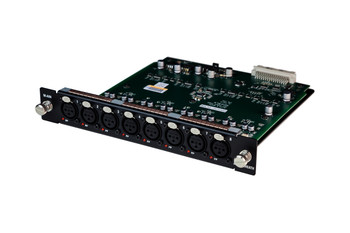Description
PREMIUM 8-CHANNEL PREAMP
For those looking to get the highest levels of audio performance from their dLive, Avantis or SQ, we've created PRIME, two new modules for use with DX32 expanders.
The PRIME Input Module is a completely new Allen & Heath preamp design at the leading-edge of audio tech.
Using the very latest converter technology and ultra-linear components combined with meticulous design, the PRIME Input module lets you exploit the full potential of our 96kHz XCVI FPGA core, delivering next-level audio quality for critical live, broadcast and studio applications.
Available as 8-channel cards for mounting directly into a DX32, you can create the configuration you require, whether it's for a handful of critical 'money' channels, or a whole orchestra section.
What makes it so good? Using years of experience in combination with ultramodern technology, we believe we've redefined transparency, slashing THD and vastly improving noise performance, while ensuring wickedly fast slew-rates for incredible transient response.
FEATURES
- Next-generation preamp design with DC coupled gain stage
- Use with DX32 for SQ, DLIVE & Avantis
- Each individual channel is fine-tuned by hand for optimum common mode performance
- Meticulous design of grounding and power supply to minimise noise and distortion
- Full metal shielding for increased RF rejection throughout
- The very latest 32-bit / 96kHz ADC for class-leading conversion
- 4 Channels of summed ADC per input for extended dynamic range and increased SNR
- Optimized for use with the 96kHz XCVI FPGA Core
PRIME Input technology
With an ultra-flat frequency response from 1Hz all the way up to 40kHz, and an incredibly fast slew rate, PRIME delivers detailed and articulate audio to the mix engine at the highest possible resolution with breath-taking transient response, and full range linearity.
While most preamps are based on AC coupled stages, PRIME has a DC coupled gain stage which eliminates the LF distortion typical of AC coupling, vastly improving low frequency linearity and phase response. This unique design calls for painstaking component choice and layout in addition to intensive per channel component trimming during commissioning.
Ultra-linear design and components
Because linearity was paramount in the design process, our design team made several innovations to improve high input level handling. A super-matched low noise quad transistor package on the front end dramatically reduces thermally induced very low frequency anomalies.
Audiophile grade Nichicon FG (Fine Gold) electrolytic capacitors – manufactured using state of the art etching techniques – have been utilised in the signal path.
Naturally, PRIME employs the very latest 32bit / 96kHz analogue-to-digital converters, but more importantly, the design team used several devices in parallel on each channel to reduce distortion and optimise noise and dynamic range. 8 channels of analogue-to-digital conversion are employed for every pair of input channels yielding increased headroom and superior SNR compared to standard AD implementations.
The ADC system can also be user configured for anti-aliasing roll-off characteristics: either fast or slow roll-off and ultra low latency delay, the sound engineer can pick optimal settings for particular applications or music.
To further preserve signal integrity, the PRIME circuitry is encased in full metal shielding for increased RF rejection throughout the signal path.
Finally, before a PRIME Input module leaves our factory, each unit has its individual preamps trimmed by hand to meet our exacting requirements for feedback path and common mode rejection.
Now that's attention to detail.
Build Your PRIME Rack
Any combination of PRIME Input and Output cards can be installed in a DX32 modular expander. PRIME modules can also be mixed with existing analogue and digital DX32 I/O modules.
Maximum PRIME I/O in fully expanded dLive and SQ systems:
- dLive S Class: 92 PRIME I/O modules
- dLive C Class: 44 PRIME I/O modules
- Avantis: 48 PRIME I/O modules
- SQ: 32 PRIME I/O modules
Refer to the DX System Guide for more information on DX expansion capabilities.
Specifications
Inputs
- ADC 96kHz, 32-bit Delta-Sigma
- Mic/Line XLR Inputs Balanced XLR, +48V phantom power
- Mic/Line Preamp Fully recallable
- Input Sensitivity (dLive) -60 to +15dBu
- Input Sensitivity (SQ) -60 to +20dBu
- Analogue Gain (dLive) +5 to +60dB, 1dB steps
- Analogue Gain (SQ) 0 to +60dB, 1dB steps
- Pad -20dB Active PAD
- Maximum Input Level +38dBu (PAD in)
- Input Impedance >4kΩ (Pad out), >10kΩ (Pad in)
- Mic EIN -127.5dBu with 150Ω source
- Phantom Power indication Per socket, internal or external phantom power sensing, triggered at 24V
- Measured Prime in to AES out, 20-20kHz, minimum Gain, Pad out.
- Full Signal Dynamic Range 114.8dB
- Noise at 0dB gain -96.8dBu
- Frequency Response to AES output
- At 0dB gain 10Hz - 20kHz +0/-0.3dB
- At 30dB gain 10Hz - 20kHz +0/-0.3dB
- At 60dB gain 10Hz - 20kHz +0/-0.25dB
- THD+N (analogue in to AES out)
- 0.0009% @ +10dBu out 0dB gain
- 0.0009% @ +10dBu out 10dB gain
- 0.001% @ +10dBu out 20dB gain
- 0.0011% @ +10dBu out 30dB gain
Outputs
- DAC 96kHz, 32-bit Delta-Sigma
- Analogue XLR Outputs
- Output Impedance <60Ω
- Nominal Output +4dBu = 0dB meter reading
- Maximum Output Level +22dBu
- Residual Output Noise -94dBu (22-22kHz)
- THD+N -105dB (22-22kHz) @1kHz
- Crosstalk separation -94dBu (22-22kHz) @1kH








